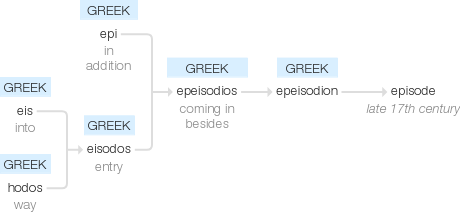Episode
late 17th century (denoting a section between songs in Greek tragedy): from Greek epeisodion, neuter of epeisodios ‘coming in besides’, from epi ‘in addition’ + eisodos ‘entry’ (from eis ‘into’ + hodos ‘way’).
wiktionary
From French épisode, from New Latin *epīsodium, from Ancient Greek ἐπεισόδιον(epeisódion, “a parenthetic addition, episode”), neuter of ἐπεισόδιος(epeisódios, “following upon the entrance, coming in besides, adventitious”), from ἐπί(epí, “on”) + εἰς(eis, “into”) + ὁδός(hodós, “way”).
etymonline
episode (n.)
1670s, "commentary between two choric songs in a Greek tragedy," also "an incidental narrative or digression within a story, poem, etc.," from French épisode or directly from Greek epeisodion "an episode," literally "an addition," noun use of neuter of epeisodios "coming in besides," from epi "in addition" (see epi-) + eisodos "a coming in, entrance" (from PIE root *en "in").
The second element is a compound of eis "into" + hodos "a way, path; a journey; a method, system," a word of uncertain origin (see Exodus). Transferred sense of "outstanding incident, experience" first recorded in English 1773. Transferred by 1930s to individual broadcasts of serial radio programs.
